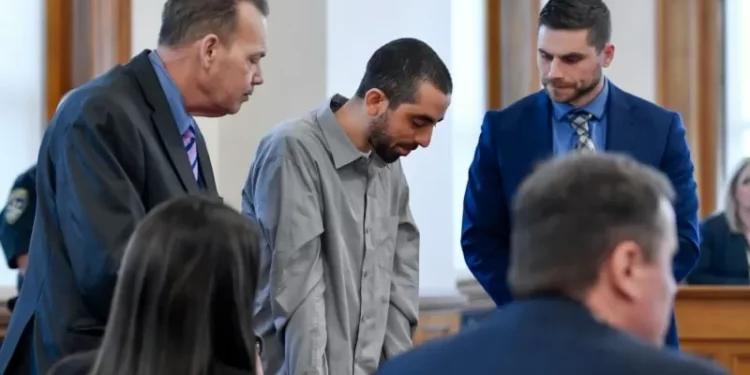In a shocking turn of events, a New Jersey man was convicted of attempted murder on Friday for attacking renowned author Salman Rushdie at a lecture in Mayville, New York in 2022. The incident left Rushdie, who is best known for his novel “Midnight’s Children,” blind in one eye.
Hadi Matar, 27, stormed onto the stage at the Chautauqua Institution where Rushdie was scheduled to speak on August 12, 2022. He proceeded to stab the 77-year-old novelist multiple times in front of a live audience. The attack also left another man, who was on stage with Rushdie, wounded.
After just two hours of deliberation, the jury found Matar guilty of attempted murder and assault. Rushdie, who was the key witness during the seven-day trial, described the horrific attack and his long and painful road to recovery.
Matar, who showed no visible reaction when the verdict was delivered, was led out of the courtroom in handcuffs. As he left, he made a statement echoing his frequent remarks of “Free Palestine.” His attorney, Nathaniel Barone, stated that while Matar was disappointed with the verdict, he was prepared for it.
During his closing argument, District Attorney Jason Schmidt played a slow-motion video of the attack for the jury. The footage clearly showed Matar entering the stage, walking up a staircase, and then running towards Rushdie with a knife.
Schmidt pointed out the unprovoked and targeted nature of the attack, stating that while there were many people present that day, Matar had one specific target in mind. He also reminded the jury that Rushdie’s injuries were life-threatening and could have been fatal without quick treatment.
On the other hand, Matar’s defense team argued that the prosecution had not proved his intent to kill Rushdie. They emphasized the fact that Matar had knives with him but no gun or bomb, and that Rushdie’s heart and lungs were not injured.
However, Schmidt countered by stating that stabbing someone multiple times in the face and neck is bound to result in a fatality. He also highlighted the testimony of a trauma surgeon who confirmed that Rushdie’s injuries would have been fatal without prompt medical intervention.
The jury was also shown video footage of Matar approaching Rushdie from behind and stabbing at his torso with a knife. Rushdie, who was seated at the time, raised his arms and tried to fight off the attacker. The two men then fell to the ground, surrounded by onlookers who rushed in to intervene.
In the recordings, we can hear the gasps and screams of the audience as the attack takes place. The founder of City of Asylum Pittsburgh, Henry Reese, who was also on stage with Rushdie, suffered a gash to his forehead, leading to the assault charge against Matar.
The judge has set the sentencing for April 23, and Matar could face up to 25 years in prison for his heinous crime.
The incident has shaken the literary world and sparked discussions about the safety of writers. Rushdie, who has faced death threats in the past for his controversial novel “The Satanic Verses,” was in Mayville to discuss the importance of protecting writers with Henry Reese.
The Chautauqua Institution, which is known for promoting intellectual and cultural growth, had taken all necessary security measures for the event. However, Matar managed to evade them and carry out his attack.
This incident serves as a reminder of the importance of protecting freedom of expression and the need for stricter security measures at public events. It is a testament to the bravery and resilience of Rushdie and other writers who continue to challenge societal norms and push boundaries through their work.
As the literary community waits for the sentencing of Matar, they also come together to show support for Rushdie and his unwavering commitment to bringing important issues to light through his writing.
Despite facing such a traumatic and life-altering experience, Rushdie remains an inspiration to many for his courage and determination to continue speaking out. The hope is that justice will be served, and this incident will serve as a wake-up call for stricter security measures to protect writers and their freedom of expression.







